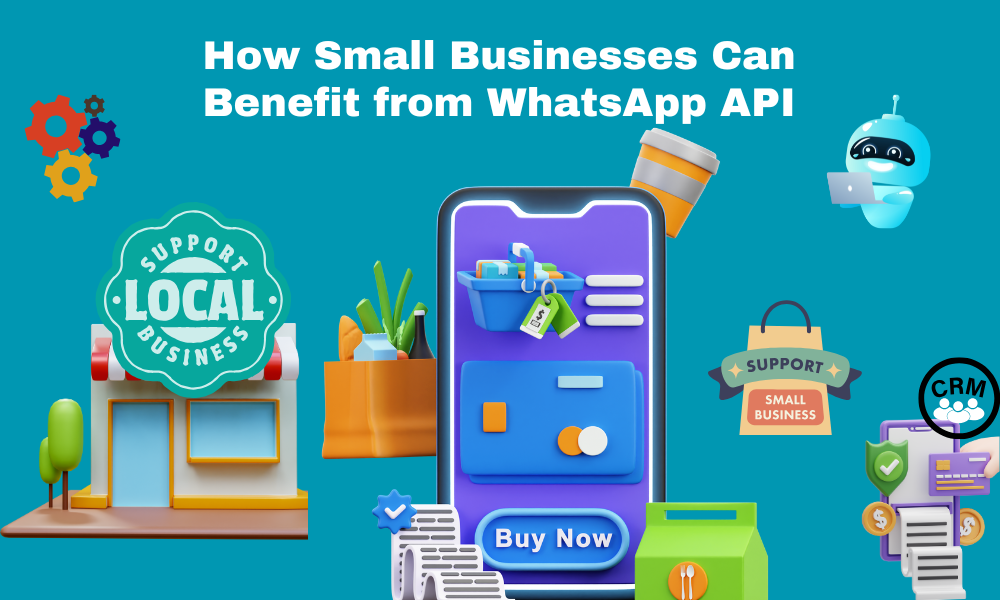
In today’s digital-first world, small businesses need efficient, cost-effective, and scalable ways to connect with their customers. WhatsApp API, with over 2 billion users worldwide, has become one of the most powerful communication tools for businesses.
While the WhatsApp Business App is great for small-scale operations, the WhatsApp Business API offers advanced features that allow businesses to automate, personalize, and scale their customer interactions.
What is WhatsApp API?
The WhatsApp API is a business solution that allows companies to integrate WhatsApp messaging into their systems, enabling automated and scalable communication with customers. It is primarily used for customer support, notifications, and marketing.
Why Small Businesses Should Use WhatsApp API :
1. Automate Customer Conversations with Chatbots
✅ Answer FAQs instantly (e.g., pricing, product details, delivery tracking)
✅ Handle multiple queries 24/7 without human intervention
✅ Reduce response time and improve customer satisfaction
🚀 Example: A small clothing brand can set up a WhatsApp chatbot to instantly answer customer questions about order status, return policies, and product availability.
2. Enable Seamless Sales and E-commerce
✅ Showcase product catalogs directly on WhatsApp
✅ Allow customers to place orders through chat
✅ Provide real-time order updates and support
🚀 Example: A home bakery can use WhatsApp API to share a menu, take orders, and update customers about delivery time, all within the chat.
3. Broadcast Promotional Messages and Offers
✅ Send personalized promotional messages to a large audience
✅ Announce discounts, flash sales, and new product launches
✅ Use customer segmentation to send targeted offers.
🚀 Example: A local gym can send membership renewal reminders, exclusive workout plans, and limited-time discounts via WhatsApp broadcasts.
4. Improve Customer Support with Quick Replies
✅ Provide faster responses with predefined templates
✅ Assign multiple agents to handle customer queries
✅ Ensure consistent and professional communication
🚀 Example: A travel agency can automate booking confirmations and handle travel inquiries using quick replies and team collaboration.
5. Integrate with CRM and Payment Systems
✅ Track customer conversations and history within a CRM
✅ Collect payments directly via WhatsApp (UPI, PayPal, or credit cards)
✅ Streamline customer support with ticketing systems
🚀 Example: A furniture store can integrate WhatsApp API with its CRM and payment gateway, allowing customers to browse, inquire, and pay—all within WhatsApp.
6. Send Personalized and Transactional Notifications
✅ Share order confirmations, invoices, appointment reminders, and OTPs
✅ Reduce no-shows by sending automated reminders
✅ Keep customers updated on their purchases
🚀 Example: A salon can automatically remind clients about their upcoming appointments and offer rescheduling options.
How to Get Started with WhatsApp Business API :
1️⃣ Choose a WhatsApp Business Solution Provider (BSP) – Since WhatsApp API is not directly available, you’ll need to partner with a WhatsApp-approved BSP
2️⃣ Register Your Business – Provide a verified phone number and set up your business profile.
3️⃣ Integrate API with Your CRM or Chatbot – Connect WhatsApp API with tools like HubSpot, Zoho, Freshdesk, or a chatbot for automation.
4️⃣ Get WhatsApp Approval for Message Templates – WhatsApp requires businesses to use pre-approved templates for bulk messages.
5️⃣ Start Engaging Customers – Once set up, you can start using automated messages, bulk notifications, and chatbots to grow your business!
Final Thoughts :
For small businesses looking to scale customer engagement, boost sales, and automate support, WhatsApp Business API is a powerful tool. With automation, CRM integration, and bulk messaging, it helps small businesses stay connected with customers, improve efficiency, and increase revenue.
🚀 Want to integrate WhatsApp API for your business? Let’s help you set up a smart, automated, and scalable customer communication strategy!

